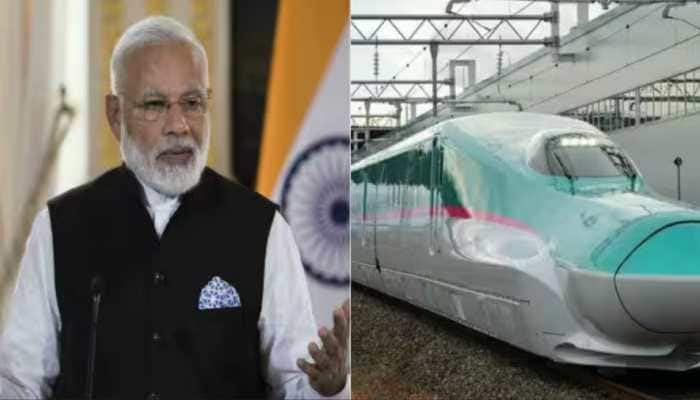Shinde-Fadnavis govt reverses half a dozen decisions of previous Uddhav-led dispensation
The incumbent government was formed after Eknath Shinde rebelled against Shiv Sena president Uddhav Thackeray and walked out with at least 40 of the 55 MLAs, leading to the collapse of the MVA government.
Trending Photos
)
Mumbai: The Eknath Shinde-BJP government in Maharashtra has either stayed or reversed at least half a dozen decisions taken by the previous Maha Vikas Aghadi (MVA) regime including shifting of the Aarey Metro car shed and restoring general consent to the CBI to probe cases in the state. The latest decision of the state government, which completed 100 days in the office earlier this month, vis-a-vis the Central Bureau of Investigation was significant given the then Shiv Sena-led MVA government had withdrawn the consent to the probe agency citing its "misuse to settle political scores".
The incumbent government was formed after Eknath Shinde rebelled against Shiv Sena president Uddhav Thackeray and walked out with at least 40 of the 55 MLAs, leading to the collapse of the MVA government. Shinde took oath as the chief minister with Bharatiya Janata Party's Devendra Fadnavis as his deputy in June this year.
Notably, after coming to power in November 2019, the then MVA government comprising Shiv Sena, Nationalist Congress Party (NCP), and Congress scrapped certain policy decisions of its predecessor BJP-Shiv Sena government led by Fadnavis.
Eknath Shinde brings back four policy decisions taken by Fadnavis
The Shinde government decided to bring back the four policy decisions taken by the Fadnavis government during 2014-2019 but were subsequently scrapped by the MVA regime.
These decisions include restoring the voting rights of farmers to Agriculture Produce Marketing Committee (APMC) markets, restarting pension for the people jailed during the Emergency, and electing village heads and municipal council presidents directly from the people.
The Maharashtra Agriculture Produce and Marketing (Development and Regulation) Act 1963 allows only members of gram panchayats, agriculture credit societies, and multi-purpose cooperative societies, to elect the members of APMCs.
In August 2017, the then BJP-Shiv Sena government brought an amendment to the legislation and gave farmers the right to elect the members and chairpersons of APMCs in the area where they sell their produce.
In January 2020, the MVA government cancelled this provision and went back to the older procedure wherein members of gram panchayats, multi-purpose co-operative societies, and agriculture credit societies elected the APMC board, claiming the APMC does not have enough funds to conduct elections on such a large scale.
The Shinde government decided to restore the voting rights of farmers who own 0.25 acre (1,000 square metres) of land and have sold their produce in the APMC market at least three times in the last five years where he or she seeks to be a voter. The electoral changes were seen as a bid by the government to break the stronghold of the NCP and Congress in the cooperative sector and local bodies.
Pension for activists who were jailed during the Emergency was also reinstated by the Shinde government.
Those who were jailed for more than a month during the Emergency will get Rs 10,000 pension from August 1. If the person is deceased, his/her spouse will get Rs 5,000 as a pension. In case the jail term was less than one month, then the figures will stand at Rs 5,000 and Rs 2,500 respectively.
The decision was first implemented by the Fadnavis government in 2017 but was reversed by the MVA government in 2020 which claimed that most of the beneficiaries were affiliated with the Rashtriya Swayamsevak Sangh (RSS).
Shinde govt also revoked Uddhav-led MVA's decision to scrap direct election of sarpanch, municipal council president
The new government also revoked the MVA's decision to scrap the direct election of sarpanch and municipal council president.
It also decided to allow the direct election of the sarpanch (village head) for local self-government bodies (gram panchayats). The state government has decided to add a provision that the gram panchayat will not be able to move a no-confidence motion against the sarpanch or deputy sarpanch in the first two years after the election and six months before the next election.
Similarly, the incumbent government also decided to elect municipal council presidents directly from the people by bringing an amendment to the Maharashtra Municipal Council, Nagar Panchayat, and Industrial Towns Act, 1965.
The erstwhile Fadnavis government in 2017 made the amendment to make way for the direct election of sarpanches. This was done to make inroads in village panchayats, traditionally controlled by the Congress and NCP, even though the elections are rarely contested on party symbols.
In January 2020, the then MVA government decided to overturn this decision claiming the differences between ideologies of sarpanchs and members of gram panchayats were a hurdle in developmental work.
In the first cabinet meeting after taking over, the Shinde government stayed the shifting of the Metro car shed from green lung Aarey Colony to Kanjurmarg in Mumbai.
Incidentally, shifting the Metro car shed from Aarey to Kanjurmarg was the first decision taken by the Uddhav Thackeray-led MVA dispensation in 2019.
In March 2021, the Mumbai Metropolitan Region Development Authority (MMRDA) told the High Court that the Kanjurmarg plot was better suited than the Aarey as the land admeasuring 102 acres from survey No. 275 of village Kanjur was required for constructing the car shed for Metro lines 3,4 and 6 and also an interchange station for proposed line 14.
The incumbent government has also cancelled development projects worth Rs 850 crore from the rural development department and fund allocation from district planning committees, which were decided by the previous MVA government, arguing the allocation of funds and projects was unequal as only NCP MLAs were favoured.
Stay informed on all the latest news, real-time breaking news updates, and follow all the important headlines in india news and world News on Zee News.
Live Tv







)
)
)
)
)
)
)
)
)
)
